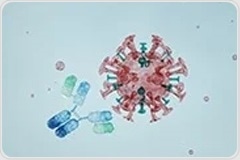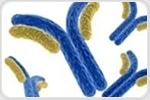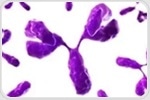
|
|
|
| |

|
|
| |
The latest antibodies news from News Medical |
|
|
|
 | | |
 Accelerating Antibody Discovery From Concept to IND Accelerating Antibody Discovery From Concept to IND
This eBook from Pharmaron explores integrated antibody discovery and development, covering monoclonal, bispecific, and multispecific programs. Learn how phage display, humanization, Fc engineering, high-throughput expression, advanced biophysical characterization, and robust PK/PD bioanalysis combine with GMP manufacturing, GLP toxicology, and regulatory support to accelerate confident IND submission for modern antibody pipelines.
| |
|
|
| |  | | |  The lower hinge of immunoglobulin G (IgG), an overlooked part of the antibody, acts as a structural and functional control hub, according to a study by researchers at Science Tokyo. The lower hinge of immunoglobulin G (IgG), an overlooked part of the antibody, acts as a structural and functional control hub, according to a study by researchers at Science Tokyo. | | | | |  Scientists at The Wistar Institute have developed an HIV vaccine candidate that achieves something never before observed in the field: inducing neutralizing antibodies against HIV after a single immunization in nonhuman primates. Scientists at The Wistar Institute have developed an HIV vaccine candidate that achieves something never before observed in the field: inducing neutralizing antibodies against HIV after a single immunization in nonhuman primates. | | | | |  Allergic diseases represent a major global health burden, placing significant strain on healthcare systems worldwide. Severe conditions such as anaphylaxis, asthma, food allergy, and allergic rhinitis are driven by immunoglobulin E (IgE), an antibody that binds to immune cells, including mast cells and basophils. Allergic diseases represent a major global health burden, placing significant strain on healthcare systems worldwide. Severe conditions such as anaphylaxis, asthma, food allergy, and allergic rhinitis are driven by immunoglobulin E (IgE), an antibody that binds to immune cells, including mast cells and basophils. | | | | |  An international research consortium, led by scientists at VIB and UGent, has developed a new platform that could change how antibody medicines are tested and brought to patients. The An international research consortium, led by scientists at VIB and UGent, has developed a new platform that could change how antibody medicines are tested and brought to patients. The | | | | |  The lower hinge of immunoglobulin G (IgG), an overlooked part of the antibody, acts as a structural and functional control hub, according to a study by researchers at Science Tokyo. The lower hinge of immunoglobulin G (IgG), an overlooked part of the antibody, acts as a structural and functional control hub, according to a study by researchers at Science Tokyo. | |
|
|
|  | | | How would you rate today's newsletter?
| |
|
|
|  | | |
 |
Stay updated with the latest in health and medical news! Follow News‑Medical.net on Google News for real‑time updates. Click here to follow us now. |
| |
|
|
|
|
|
|
|